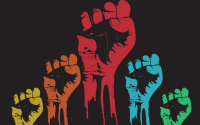27 December 2005monbiot.com / Guardian
In reading the reports of the trial of the Turkish novelist Orhan Pamuk, you are struck by two things. The first of course is the anachronistic brutality of the country's laws. Mr Pamuk, like scores of other writers and journalists, is being prosecuted for "denigrating Turkishness", which means that he dared to mention the Armenian genocide in the first world war and the killing of the Kurds in the past decade. The second is its staggering, blithering stupidity. If there is one course of action which could be calculated to turn these massacres into live issues, it is the trial of the country's foremost novelist for mentioning them.
As it prepares for accession, the Turkish government will discover that the other members of the European Union have found a more effective means of suppression. Without legal coercion, without the use of baying mobs to drive writers from their homes, we have developed an almost infinite capacity to forget our own atrocities.
Atrocities? Which atrocities? When a Turkish writer uses that word, everyone in Turkey knows what he is talking about, even if they deny it vehemently. But most British people will stare at you blankly. So let me give you two examples, both of which are as well documented as the Armenian genocide.
In his book Late Victorian Holocausts, published in 2001, Mike Davis tells the story of the famines which killed between 12 and 29 million Indians(1). These people were, he demonstrates, murdered by British state policy.
When an El Nino drought destituted the farmers of the Deccan plateau in 1876 there was a net surplus of rice and wheat in India. But the viceroy, Lord Lytton, insisted that nothing should prevent its export to England. In 1877 and 1878, at height of the famine, grain merchants exported a record 6.4 million hundredweight of wheat. As the peasants began to starve, government officials were ordered "to discourage relief works in every possible way"(2). The Anti-Charitable Contributions Act of 1877 prohibited "at the pain of imprisonment private relief donations that potentially interfered with the market fixing of grain prices." The only relief permitted in most districts was hard labour, from which anyone in an advanced state of starvation was turned away. Within the labour camps, the workers were given less food than the inmates of Buchenwald. In 1877, monthly mortality in the camps equated to an annual death rate of 94%.
As millions died, the imperial government launched "a militarized campaign to collect the tax arrears accumulated during the drought." The money, which ruined those who might otherwise have survived the famine, was used by Lytton to fund his war in Afghanistan. Even in places which had produced a crop surplus, the government's export policies, like Stalin's in the Ukraine, manufactured hunger. In the North-western provinces, Oud and the Punjab, which had brought in record harvests in the preceding three years, at least 1.25m died.
Three recent books – Britain's Gulag by Caroline Elkins, Histories of the Hanged by David Anderson and Web of Deceit by Mark Curtis – show how white settlers and British troops suppressed the Mau Mau revolt in Kenya in the 1950s. Thrown off their best land and deprived of political rights, the Kikuyu started to organise – some of them violently – against colonial rule. The British responded by driving up to 320,000 of them into concentration camps(3). Most of the remainder – over a million – were held in "enclosed villages". Prisoners were questioned with the help of "slicing off ears, boring holes in eardrums, flogging until death, pouring paraffin over suspects who were then set alight, and burning eardrums with lit cigarettes."(4) British soldiers used a "metal castrating instrument" to cut off testicles and fingers. "By the time I cut his balls off," one settler boasted, "he had no ears, and his eyeball, the right one, I think, was hanging out of its socket"(5). The soldiers were told they could shoot anyone they liked "provided they were black"(6). Elkins's evidence suggests that over 100,000 Kikuyu were either killed by the British or died of disease and starvation in the camps. David Anderson documents the hanging of 1090 suspected rebels: far more than the French executed in Algeria(7). Thousands more were summarily executed by soldiers, who claimed they had "failed to halt" when challenged.
These are just two examples of at least twenty such atrocities overseen and organised by the British government or British colonial settlers: they include, for example, the Tasmanian genocide, the use of collective punishment in Malaya, the bombing of villages in Oman, the dirty war in North Yemen, the evacuation of Diego Garcia. Some of them might trigger a vague, brainstem memory in a few thousand readers, but most people would have no idea what I'm talking about. Max Hastings, in the Guardian today, laments our "relative lack of interest in Stalin and Mao's crimes."(8) But at least we are aware that they happened.
In the Express we can read the historian Andrew Roberts arguing that for "the vast majority of its half millennium-long history, the British Empire was an exemplary force for good. ... the British gave up their Empire largely without bloodshed, after having tried to educate their successor governments in the ways of democracy and representative institutions"(9)(presumably by locking up their future leaders). In the Sunday Telegraph, he insists that "the British empire delivered astonishing growth rates, at least in those places fortunate enough to be coloured pink on the globe."(10) (Compare this to Mike Davis's central finding, that "there was no increase in India's per capita income from 1757 to 1947", or to Prasannan Parthasarathi's demonstration that "South Indian labourers had higher earnings than their British counterparts in the 18th century and lived lives of greater financial security."(11)) In the Daily Telegraph, John Keegan asserts that "the empire became in its last years highly benevolent and moralistic." The Victorians "set out to bring civilisation and good government to their colonies and to leave when they were no longer welcome. In almost every country, once coloured red on the map, they stuck to their resolve."(12)
There is one, rightly sacred Holocaust in European history. All the others can be ignored, denied or belittled. As Mark Curtis points out, the dominant system of thought in Britain "promotes one key concept that underpins everything else – the idea of Britain's basic benevolence. ... Criticism of foreign policies is certainly possible, and normal, but within narrow limits which show "exceptions" to, or "mistakes" in, promoting the rule of basic benevolence."(13) This idea, I fear, is the true "sense of British cultural identity" whose alleged loss Max laments today. No judge or censor is required to enforce it. The men who own the papers simply commission the stories they want to read.
Turkey's accession to the European Union, now jeopardised by the trial of Orhan Pamuk, requires not that it comes to terms with its atrocities; only that it permits its writers to rage impotently against them. If the government wants the genocide of the Armenians to be forgotten, it should drop its censorship laws and let people say what they want. It needs only allow Richard Desmond and the Barclay brothers to buy up its newspapers, and the past will never trouble it again.
www.monbiot.com
References:
1. Mike Davis, 2001. Late Victorian Holocausts: El Nino Famines and the Making of the Third World. Verso, London.
2. An order from the lieutenant-governor Sir George Couper to his district officers. Quoted in Mike Davis, ibid.
3. Caroline Elkins, 2005. Britain's Gulag: The Brutal End of Empire in Kenya. Jonathan Cape, London.
4. Mark Curtis, 2003. Web of Deceit: Britain's Real Role in the World. Vintage, London.
5. Caroline Elkins, ibid.
6. Mark Curtis, ibid.
7. David Anderson, 2005. Histories of the Hanged: Britain's Dirty War in Kenya and the End of Empire. Weidenfeld, London.
8. Max Hastings, 27th December 2005. This is the country of Drake and Pepys, not Shaka Zulu. The Guardian
9. Andrew Roberts, 13th July 2004. We Should Take Pride in Britain's Empire Past. The Express.
10. Andrew Roberts, 16th January 2005. Why we need empires. The Sunday Telegraph.
11. Prasannan Parthasarathi, 1998. Rethinking wages and competitiveness in Eighteenth-Century Britain and South India. Past and Present 158. Quoted by Mike Davis, ibid.
12. John Keegan, 14th July 2004. The Empire is Worthy of Honour. The Daily Telegraph.
13. Mark Curtis, ibid.






